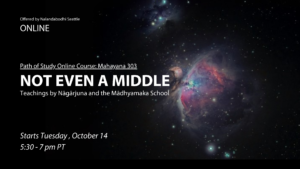May all sentient beings enjoy happiness and the root of happiness.
May they be free from suffering and the root of suffering.
May they not be separated from the great happiness devoid of suffering.
May they dwell in the great equanimity free from passion, aggression, and prejudice.— The Four Immeasurables
You are what you eat. Such common sense applies to our mind as much as our body. Another way of putting it is that we imitate what we contemplate. Luckily, we have some choice in what we consume—with our mouths and with our eyes and ears.
There is little more satisfying than making a delicious meal and sharing it with those you love. It’s so easy to see and taste the value of this, but we don’t usually pay as close attention to the nutrition of what we feed our minds.
A steady diet of digital media and other distractions is as toxic for our mind as junk food is for our body. Wouldn’t it be better if we nourished ourselves with the Four Immeasurables, a “mental superfood” that is truly beneficial for our heart—literally and figuratively? What if we cultivated in ourselves the qualities pointed out in that four-line verse, and then shared that goodness with others?
In the Buddhist tradition, meditating on the Four Immeasurables—stated most simply as love, compassion, joy, and equanimity—has been used effectively for thousands of years to enhance these positive qualities. This set of four contemplations is a strong countermeasure to our habitual attachments of clinging to self and believing in the storylines of our emotional baggage. Exploring them deeply helps shift our attitude away from self-centeredness and toward basic goodness. From that internal change, our external behavior naturally follows.
They are called “immeasurable” for at least two reasons. First, as a method of meditation, they have limitless potential to open our hearts. Second, the result of our openheartedness is equally vast and profound, benefiting countless beings.
We can nurture these qualities in ourselves and offer them both aspirationally and directly to help others. We can discover our infinite capacity to love, to feel compassion, to share joy, and to experience equanimity—the greatest renewable resources of all.
Future articles will explore each of the Four Immeasurables separately. In the meantime, happy contemplation!
Exercise
- To start an analytical meditation session, find a quiet space. Set a positive intention.
- Do a few minutes of calm abiding meditation, and then slowly recite the verse three times.
- Engage your thinking mind with curiosity and creativity. Go beyond the words to experience the meaning that they convey. Allow yourself to deeply feel what they mean to you.
- You can contemplate all four, or focus on just one, reciting each line as necessary.
- Conclude with a few minutes of calm abiding meditation. Open your heart and offer any goodness from the session to others.

Nick Vail is a second-generation Buddhist who lives in Seattle. A single parent, he enjoys quality time with his son, playing the guitar, singing, dancing, and meditation.






